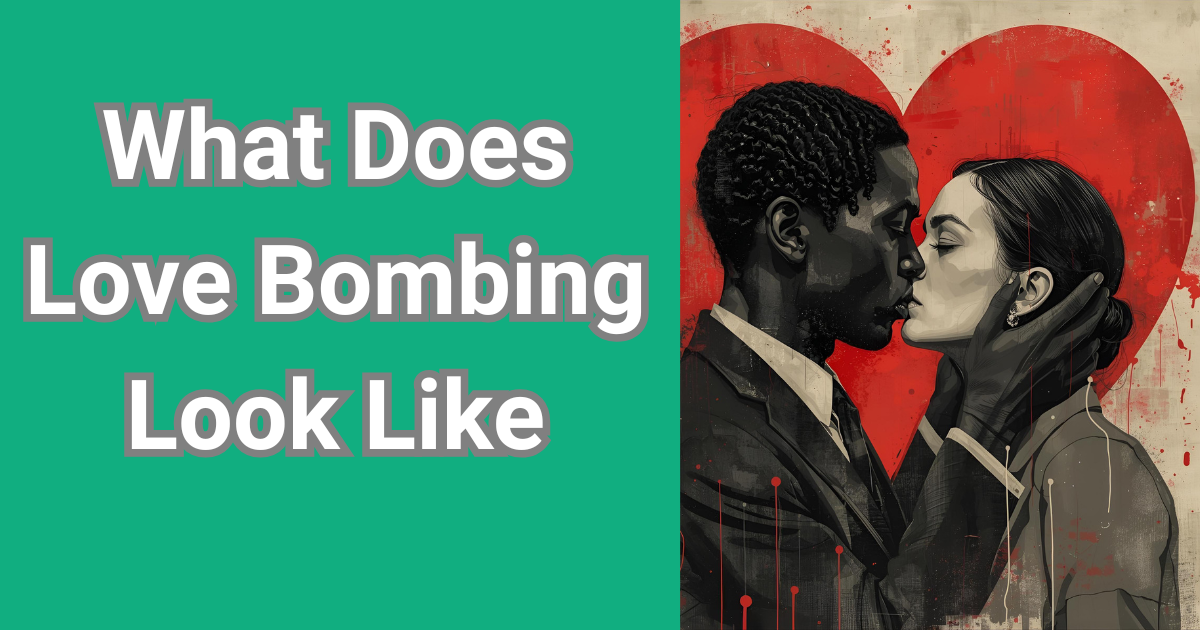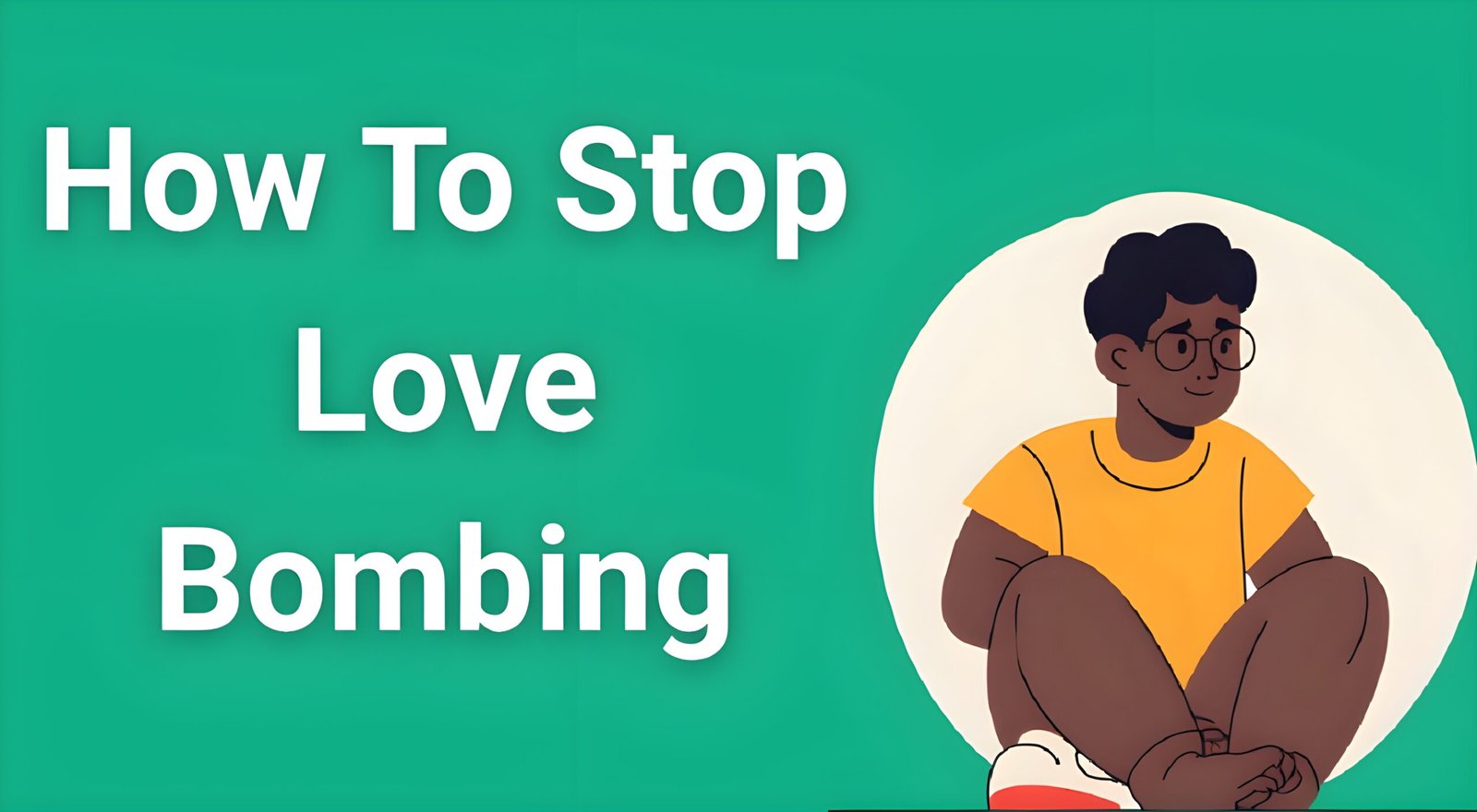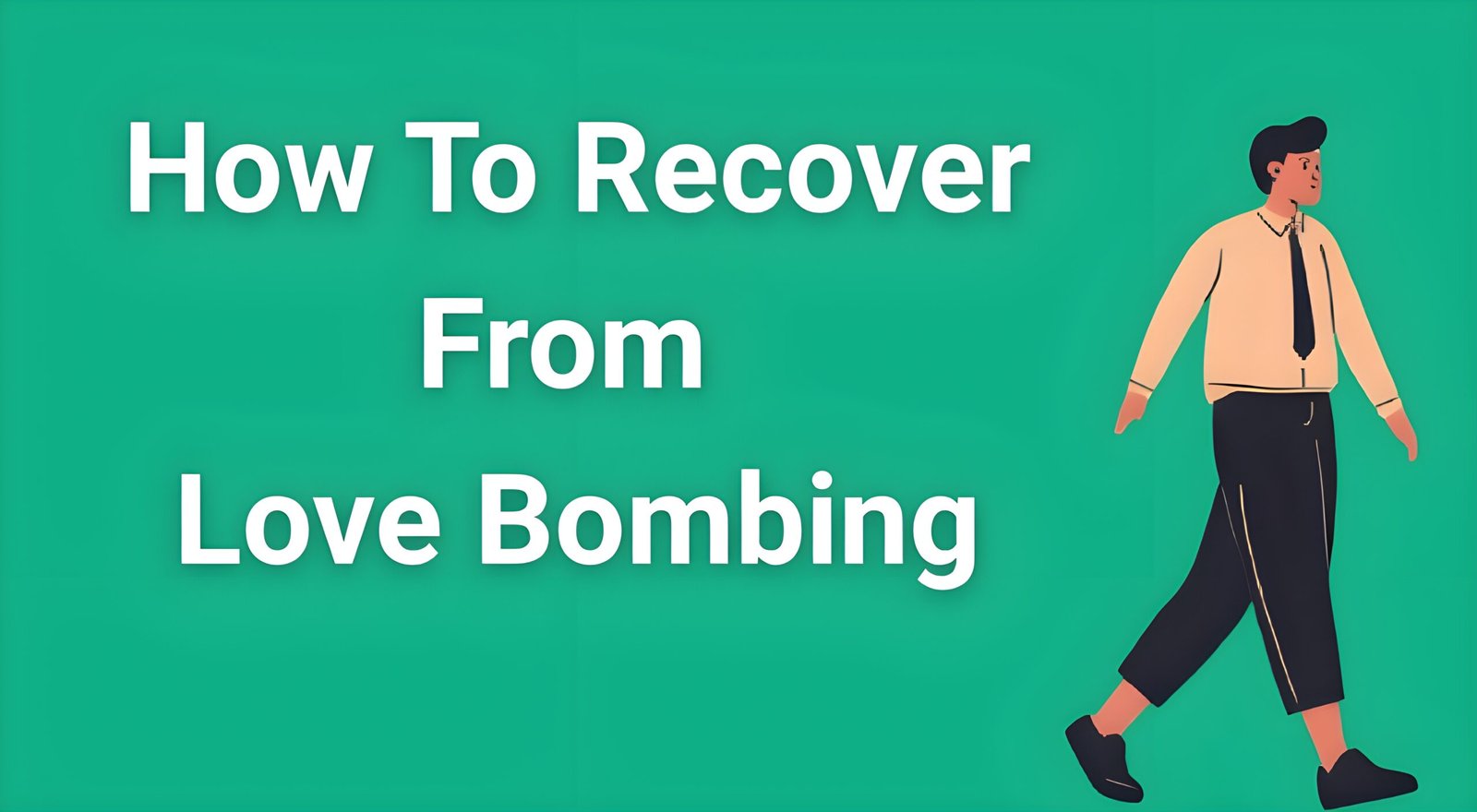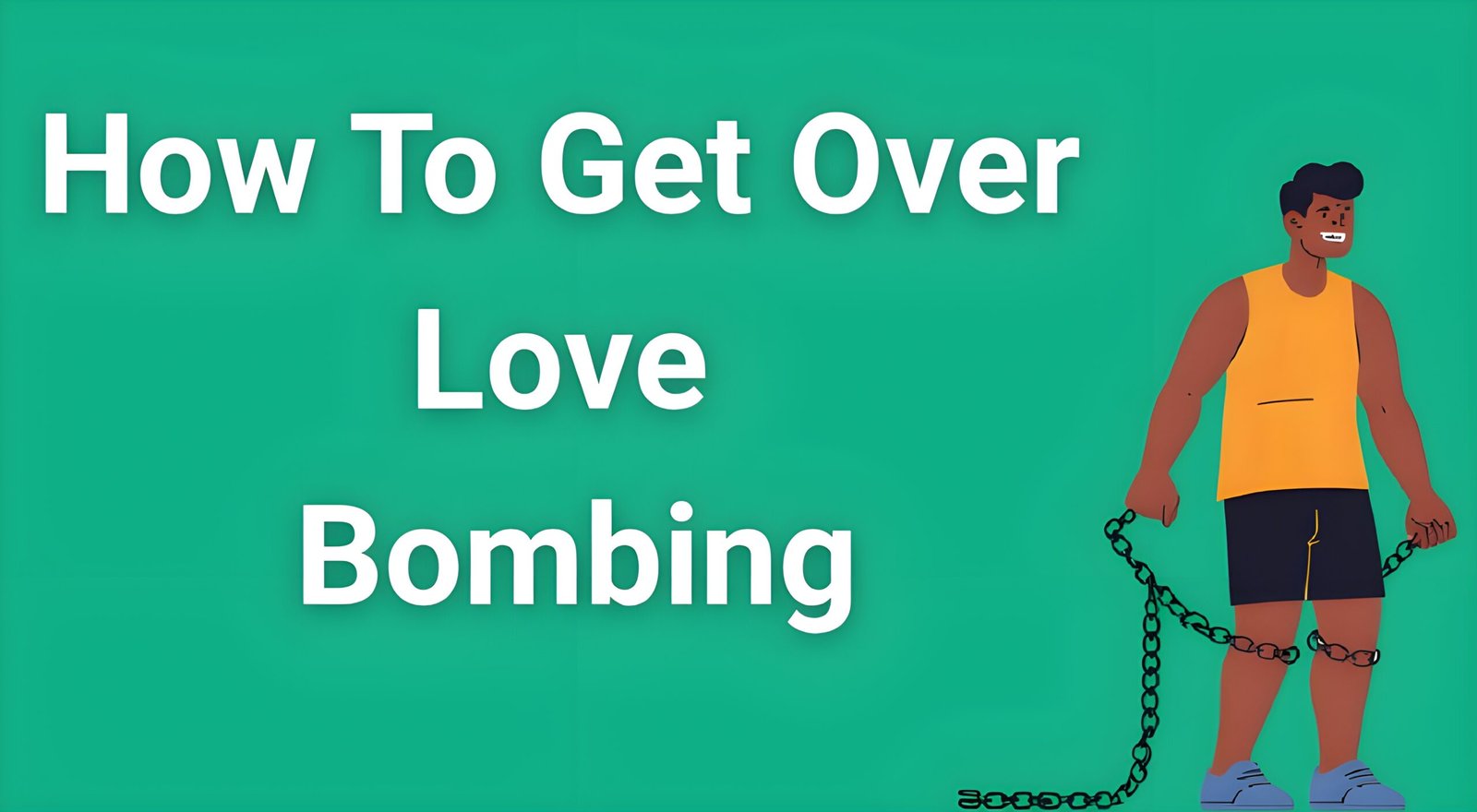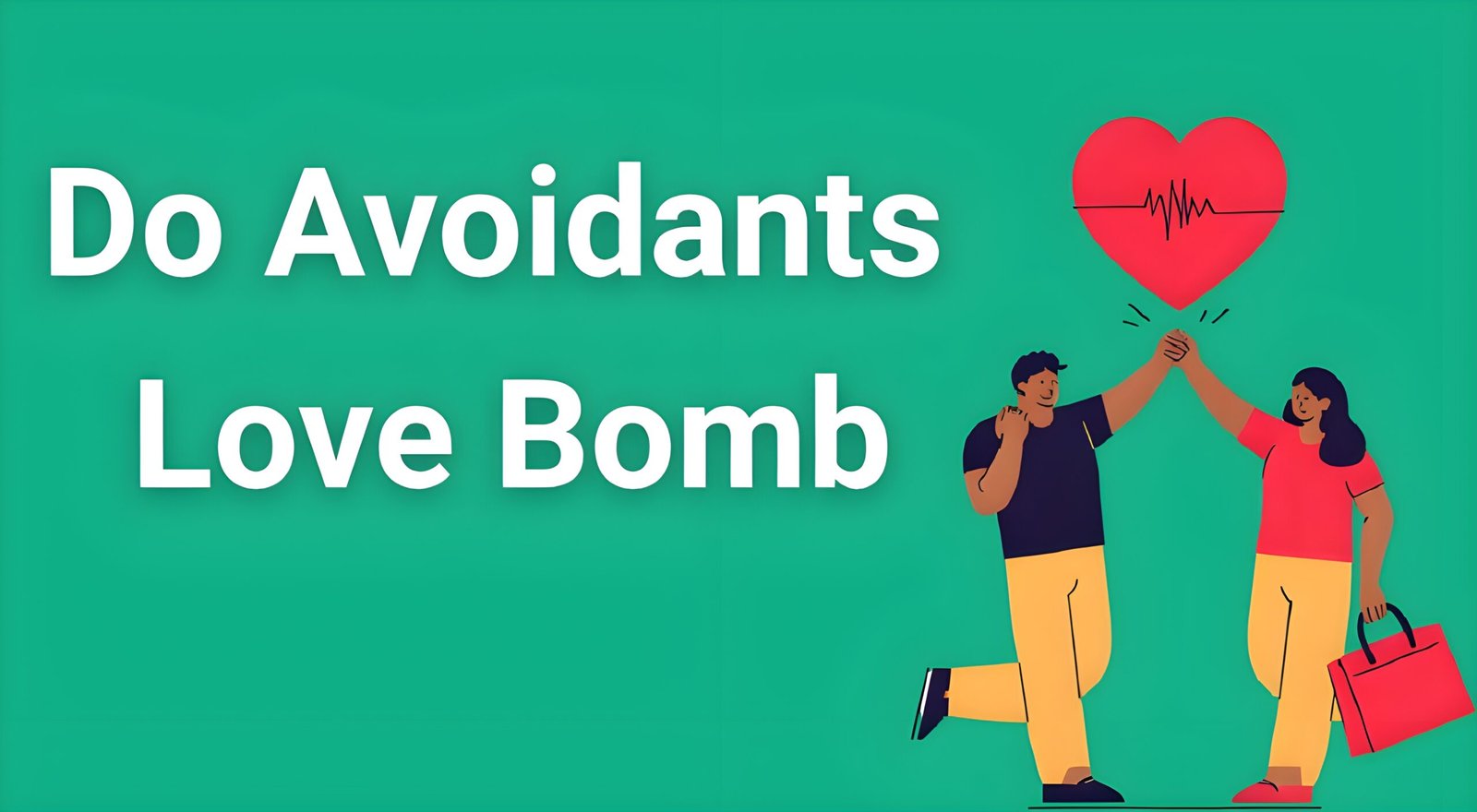What does love bombing look like when it’s happening to you? If you’re asking this question, chances are you’re experiencing something that feels simultaneously wonderful and overwhelming—and your instincts are telling you something isn’t quite right.
- Understanding Love Bombing: What Does Love Bombing Look Like?
- The Psychology: Why Love Bombing Works So Effectively
- 12 Concrete Signs: What Does Love Bombing Look Like in Action?
- The Love Bombing Cycle: What Comes Next
- Who Uses Love Bombing and Why
- Advanced Love Bombing Tactics and Variations
- Breaking Free: Strategies for Different Situations
- Recovery and Healing After Love Bombing
- Prevention: Protecting Yourself in Future Relationships
- Red Flags Checklist: What Does Love Bombing Look Like?
- Conclusion
- Frequently Asked Questions
In my work with thousands of survivors through my top-rated Substack newsletter, I’ve helped people identify exactly what does love bombing look like in real-time situations. Understanding what love bombing looks like is crucial because this manipulation tactic is designed to feel like everything you’ve ever wanted in a relationship, making it incredibly difficult to recognize as abuse.
The statistics reveal just how common this experience is: a 2022 survey found that 70% of more than 1,000 participants had experienced some form of love bombing behavior, with women encountering narcissistic love bombing at significantly higher rates than men. Yet despite how prevalent these manipulation tactics are, many people don’t understand what does love bombing look like until they’re already trauma bonded to their abuser.
Understanding Love Bombing: What Does Love Bombing Look Like?
Love bombing is a calculated manipulation technique where someone overwhelms you with excessive attention, affection, and grand romantic gestures to gain psychological control over you. What does love bombing look like from the abuser’s perspective? It’s a strategic assault on your boundaries and judgment, disguised as the most romantic experience of your life.
This narcissistic abuse tactic isn’t genuine love—it’s emotional manipulation designed to create trauma bonds and psychological dependency. Love bombers use intense displays of affection to bypass your natural caution and critical thinking, making you vulnerable to future control and abuse.
Semantic Keywords and Related Terms:
- Narcissistic love bombing behavior
- Emotional manipulation tactics
- Toxic relationship red flags
- Narcissistic abuse cycle
- Trauma bonding patterns
- Psychological manipulation signs
- Controlling relationship behavior
- Emotional abuse warning signs
- Gaslighting techniques
- Idealization phase behaviors
The Psychology: Why Love Bombing Works So Effectively
What does love bombing look like from a neurological standpoint? It hijacks your brain’s reward system, flooding you with dopamine, oxytocin, and other bonding chemicals. This creates an addiction-like dependency that becomes incredibly difficult to break—which is exactly the goal.
Understanding what does love bombing look like requires recognizing who’s most vulnerable:
High-empathy individuals often fall victim to love bombing because they’re naturally giving and want to reciprocate the intense affection they’re receiving.
People with anxious attachment styles mistake the constant contact and reassurance for security, not recognizing it as surveillance and control.
Those recovering from previous relationships may be particularly susceptible because love bombing feels like everything their previous partner wasn’t.
Individuals with low self-esteem are prime targets because the excessive validation feels like proof they’re finally worthy of love.
People from narcissistic families often don’t recognize love bombing red flags because intensity and chaos feel familiar and “normal.”
12 Concrete Signs: What Does Love Bombing Look Like in Action?
1. Immediate Intense Declarations of Love
What does love bombing look like in those first conversations? They’re professing deep love within days or weeks of meeting you. Common love bombing phrases include “I’ve never felt this way before,” “You’re my soulmate,” “I’ve been searching for you my whole life,” and “We’re meant to be together.”
These aren’t genuine expressions of love—they’re calculated statements designed to make you feel special and chosen. Real love develops gradually as people learn about each other’s character, values, and compatibility.
2. Excessive Communication and Digital Stalking
Love bombing communication patterns are unmistakable: your phone never stops buzzing. They text from morning until night, call multiple times daily, and expect immediate responses. What does love bombing look like digitally? Constant social media interaction, commenting on everything you post, and becoming upset if you don’t respond quickly.
This isn’t romantic attention—it’s digital surveillance disguised as devotion.
3. Expensive Gifts and Financial Love Bombing
What does love bombing look like materially? Lavish gifts that feel disproportionate to your relationship timeline. These might include expensive jewelry, surprise vacations, paying your bills without being asked, or buying things you’ve mentioned wanting.
Love bombing gifts serve multiple purposes:
- Creating financial obligation and debt
- Demonstrating their “generosity” and “love”
- Making you feel guilty for questioning their motives
- Establishing a pattern where they provide and you receive
4. Rushed Relationship Timeline and Future Faking
Love bombers push for immediate exclusivity and commitment. What does love bombing look like regarding relationship progression? They want to define the relationship within weeks, discuss moving in together rapidly, and start planning your future before you’ve had time to truly know each other.
This technique, called “future faking,” involves making elaborate plans for your shared future to create investment and prevent you from leaving.
5. Perfect Mirroring and Soulmate Claims
What does love bombing look like in terms of compatibility? Suspiciously perfect alignment with all your interests, values, and preferences. They love your favorite music, share your hobbies, have identical life goals, and seem to understand you perfectly.
This mirroring technique is strategic—they’re reflecting back what you want to see to make you believe you’ve found your “perfect match.”
6. Isolation Disguised as Special Romance
Love bombing isolation tactics start subtly. What does love bombing look like socially? They want to spend every moment together, suggest skipping social events, express jealousy about your friendships, and gradually position themselves as the only person who truly “understands” you.
Initially, this feels romantic and special, but it’s actually the beginning of systematic isolation from your support network.
7. Boundary Violations and Emotional Manipulation
What does love bombing look like when you try to establish boundaries? They react with hurt, anger, manipulation, or escalated romantic gestures. Setting normal limits—like wanting a night to yourself—becomes a relationship crisis requiring lengthy discussions and reassurances.
Healthy partners respect boundaries; love bombers see them as obstacles to overcome.
8. Emotional Intensity and Drama
Love bombing creates relationships that feel like emotional roller coasters. What does love bombing look like emotionally? Everything is intense—their love, their hurt, their joy, their anger. There’s no middle ground or peaceful moments; every interaction carries maximum emotional weight.
This intensity is deliberately addictive, creating trauma bonds that make normal, healthy relationships feel boring by comparison.
9. Premature Emotional Intimacy
What does love bombing look like regarding emotional boundaries? They share deeply personal information—childhood trauma, fears, dreams, secrets—within the first few conversations. This creates artificial intimacy and makes you feel specially chosen to receive their “vulnerability.”
This premature intimacy serves to:
- Make you feel trusted and special
- Create false emotional bonds
- Encourage you to reciprocate with your own personal information
- Establish inappropriate intimacy levels for your actual relationship timeline
10. Love Bombing vs Healthy Interest: The Key Differences
Understanding what does love bombing look like means recognizing how it differs from genuine romantic interest:
Love Bombing Behaviors:
- Pressure to commit immediately
- Can’t respect your pace or boundaries
- Makes you feel guilty for having other priorities
- Wants to isolate you from friends and family
- Shows intense jealousy disguised as love
- Makes themselves the center of your universe instantly
Healthy Romantic Interest:
- Respects your timeline and comfort level
- Encourages your outside relationships
- Shows interest in your independence and goals
- Demonstrates patience with your decision-making
- Builds trust gradually through consistent actions
- Maintains their own life and interests
11. Observable Physical and Emotional Reactions
What does love bombing look like in your body and emotions? You might experience:
- Feeling simultaneously flattered and overwhelmed
- Anxiety about keeping up with their intensity
- Exhaustion from constant communication
- Confusion about why something “so good” feels wrong
- Guilt for questioning their “amazing” treatment
- Loss of connection to your own needs and preferences
Trust these physical and emotional responses—they’re warning signals from your nervous system.
12. External Observations and Social Red Flags
What does love bombing look like to your friends and family? Often, loved ones can see the manipulation more clearly than you can because they’re not caught in the emotional intensity.
Warning signs others might notice:
- How quickly your relationship has progressed
- How much time you’re spending with this new person
- Changes in your behavior, mood, or priorities
- How isolated you’re becoming from social circles
- The controlling or possessive behavior they observe
- Your partner’s reaction to questions or concerns
The Love Bombing Cycle: What Comes Next
Understanding what does love bombing look like requires knowing it’s always phase one of a predictable abuse cycle:
Phase 1: Love Bombing (Idealization) The excessive attention, gifts, and affection you’re currently experiencing.
Phase 2: Devaluation Once they feel secure in your attachment, the criticism, control, and emotional abuse begin.
Phase 3: Discard They might suddenly end the relationship or emotionally check out while keeping you around.
Phase 4: Hoovering Attempts to draw you back using renewed love bombing tactics and promises to change.
This cycle repeats indefinitely unless you break free. What does love bombing look like in the context of this cycle? It’s the bait that hooks you into staying for the abuse that follows.
For those who recognize they’re caught in trauma bonds and can’t seem to leave despite seeing these red flags, my 30-Day Trauma Bond Recovery Workbook provides a neurologically-based recovery system that treats trauma bonds like the addiction they actually are. The workbook includes specific daily exercises designed to rewire your brain’s response patterns and break the cycle permanently.
Who Uses Love Bombing and Why
What does love bombing look like from the perpetrator’s perspective? It’s often associated with specific personality disorders and psychological patterns:
Narcissistic Personality Disorder (NPD): Use love bombing to secure narcissistic supply—constant attention, admiration, and emotional energy needed to maintain their fragile self-image.
Antisocial Personality Traits: Employ love bombing as part of broader manipulation and exploitation patterns for personal gain.
Borderline Personality Patterns: May use intense romantic pursuit driven by extreme fear of abandonment, though the underlying motivation differs from narcissistic love bombing.
Cult Leaders and Predatory Individuals: Love bombing is a documented recruitment tactic used by cults, abusive religious groups, and other predators seeking control over vulnerable people.
Advanced Love Bombing Tactics and Variations
What does love bombing look like in different contexts and relationships?
Professional Love Bombing: Excessive praise, rapid promotions, special treatment from bosses or colleagues before exploitation begins.
Friendship Love Bombing: Immediate “best friend” status, constant contact, excessive gift-giving, and jealousy about other friendships.
Family Love Bombing: Relatives who shower you with attention and gifts while simultaneously isolating you from other family members or support systems.
Digital Love Bombing: Overwhelming online attention, constant social media interaction, excessive texting, and digital surveillance disguised as care.
Financial Love Bombing: Using money, gifts, and financial support to create dependency and obligation.
Breaking Free: Strategies for Different Situations
If you’re recognizing what does love bombing look like in your own experience, your options depend on your specific circumstances. I have wrriten a detailed guide on how to get over love bombing.
If You Can Leave Safely:
- Trust your instincts about the red flags you’re seeing
- Set clear boundaries and observe their reaction
- Maintain connections with friends and family
- Document concerning behaviors
- Seek support from professionals who understand narcissistic abuse
If You’re Trauma Bonded:
- Understand that trauma bonds create neurochemical addiction
- Don’t blame yourself for finding it difficult to leave
- Focus on breaking the addiction patterns in your brain
- Build a safety plan for when you’re ready to exit
More readings
- How to Get Over Love Bombing
- How to Respond to Love Bombing
- What Happens After Love Bombing
- How to Not Love Bomb
- How to Stop Love Bombing
For those struggling to identify exactly what type of narcissist you’re dealing with and which specific tactics they’re using against you, my Personalized Narcissistic Abuse Clarity Report provides a comprehensive analysis of your unique situation. In 48-72 hours, you’ll receive a detailed breakdown of their manipulation patterns, your emotional responses, and a custom roadmap for your next steps.
If You Can’t Leave Yet: Sometimes leaving isn’t immediately possible due to financial constraints, children, housing situations, legal complications, or safety concerns.
For those who can’t leave immediately due to financial constraints, children, or other circumstances, my “How to Survive When You Can’t Leave Yet” workbook provides daily survival strategies that give you peace and protection while you’re still in the situation. This isn’t about enduring—it’s about thriving strategically until you can safely exit.
Recovery and Healing After Love Bombing
Understanding what does love bombing look like is just the beginning of your healing journey. Recovery involves several key components:
Neurochemical Healing: Your brain needs time to recover from the addiction-like effects of trauma bonding and intermittent reinforcement.
Identity Rebuilding: Love bombing often leaves survivors questioning their judgment, worth, and ability to recognize healthy relationships.
Boundary Development: Learning to set and maintain healthy boundaries in all relationships.
Trust Rebuilding: Developing confidence in your own instincts and perceptions.
Support System Reconstruction: Rebuilding connections that may have been damaged during the isolation phase.
Prevention: Protecting Yourself in Future Relationships
Once you understand what does love bombing look like, you can implement protective strategies:
Healthy Relationship Pace: Real love can wait and doesn’t pressure you to move faster than comfortable.
Boundary Respect: Healthy partners encourage boundaries and see them as relationship strengthening.
Independence Encouragement: Good partners support your friendships, goals, and individual identity.
Conflict Resolution: Healthy relationships handle disagreements with respect and compromise.
Consistency Over Intensity: Look for steady, reliable behavior rather than dramatic gestures.
Red Flags Checklist: What Does Love Bombing Look Like?
Use this checklist ( download love bombing pdf checklist here) to evaluate your current or potential relationships:
- Declares love or deep feelings within weeks of meeting
- Wants constant communication and contact
- Gives expensive or excessive gifts early in relationship
- Pushes for immediate exclusivity and commitment
- Mirrors all your interests and values perfectly
- Wants to spend every moment together
- Reacts poorly to boundaries or requests for space
- Creates emotional intensity and drama
- Shares deep personal information too quickly
- Friends and family express concern about the relationship pace
- You feel overwhelmed despite enjoying the attention
- They become upset when you spend time with others
If you’re checking multiple boxes, you may be experiencing love bombing rather than genuine romantic interest.
Conclusion
What does love bombing look like? It looks like everything you thought you wanted in a relationship—intense passion, unwavering attention, perfect compatibility, and fairy-tale romance. This is precisely what makes it so dangerous and effective as a manipulation tactic.
Understanding what does love bombing look like isn’t about becoming cynical about love or romance. It’s about protecting yourself so you can experience genuine, healthy love when it comes along. Real love is patient, respectful, and allows relationships to develop naturally over time.
If you’re currently questioning whether you’re experiencing love bombing, trust those instincts. Your nervous system is trying to protect you from a situation that looks perfect on the surface but feels wrong underneath. You deserve a relationship built on genuine respect, not manipulation disguised as romance.
Remember that recognizing what does love bombing look like is a skill that will serve you throughout your life. Armed with this knowledge, you can identify manipulation tactics early, maintain your independence and boundaries, and create space for authentic, healthy relationships to flourish.
Your healing and protection matter. Whether you’re working to understand your current situation, planning a safe exit, or learning to trust your instincts again, support and resources are available to help you navigate this journey.
Frequently Asked Questions
What does love bombing look like versus genuine romantic interest?
Love bombing creates pressure and urgency around commitment while genuine romantic interest respects your pace and boundaries. Love bombing involves excessive gifts, constant communication, and isolation from friends, while healthy interest encourages your independence and outside relationships. Love bombing pushes past your comfort zone immediately, but genuine interest allows the relationship to develop naturally over time.
How long does love bombing typically last?
Love bombing usually lasts 2-6 months, depending on how quickly the person secures your attachment and dependency. The timeline varies based on your responses—setting boundaries or showing hesitation may extend the love bombing phase. Once they feel confident you won’t leave, the behavior typically shifts to criticism, control, and devaluation.
What are the early signs of love bombing in the first week?
Early love bombing signs include constant texting or calling, declaring deep feelings immediately, expensive or excessive gifts, wanting to spend every moment together, and pushing for exclusive commitment. They share deep personal secrets too soon, mirror all your interests perfectly, and react poorly to any attempt to slow things down or set boundaries.
Can someone love bomb without meaning to hurt you?
While some people show intense enthusiasm in new relationships due to attachment issues, true love bombing involves deliberate boundary-pushing and manipulation beyond innocent excitement. Unintentional intense behavior typically responds well to gentle feedback about pacing, while love bombing escalates when boundaries are attempted. The key difference is respect for your comfort level.
What does love bombing look like in friendships and family relationships?
Love bombing in friendships involves someone wanting immediate “best friend” status, sharing deep secrets too soon, excessive gift-giving, and jealousy when you spend time with other friends. In family relationships, it might involve relatives showering you with attention and gifts while simultaneously isolating you from other family members or creating dependency through financial support.
How do you help someone who’s being love bombed?
Approach with compassion and avoid being judgmental, as criticism might push them further into isolation. Listen without trying to immediately convince them to leave, share your specific concerns about behaviors you’ve observed, and remain a consistent source of support. Avoid ultimatums but maintain your own boundaries about what you’re willing to tolerate.
What should you do if you recognize love bombing behavior in yourself?
Seek help from a mental health professional immediately who specializes in attachment issues and relationship patterns. Work on understanding your attachment style, learn healthy relationship skills, and address underlying issues driving the need to control or manipulate others. Acknowledge potential harm caused and commit to genuine change through consistent therapy.
Can a relationship recover from love bombing?
Recovery is extremely rare because love bombing is typically part of a larger pattern of manipulation and abuse that escalates over time. Most love bombers don’t genuinely see their behavior as problematic and may only promise change to maintain control. Focus on your safety and wellbeing rather than hoping for change that’s unlikely to occur.
Is love bombing always a sign of narcissistic personality disorder?
While love bombing is strongly associated with narcissistic personality disorder, it can occur with other personality disorders, attachment issues, or learned manipulation patterns. However, when love bombing is part of a pattern including control, isolation, and eventual devaluation, it constitutes emotional abuse regardless of the underlying psychological cause.

